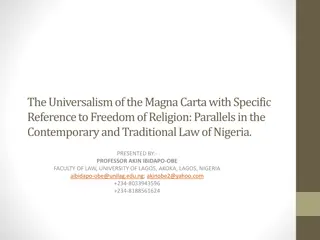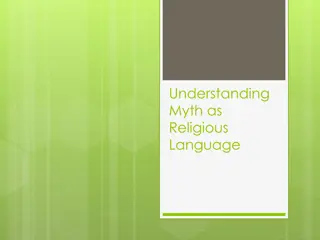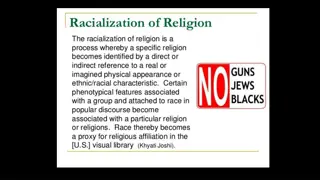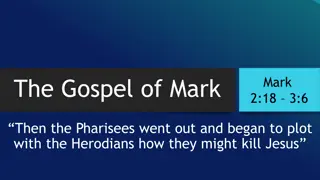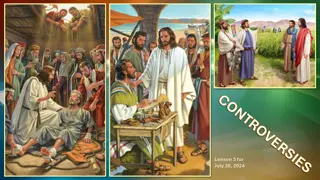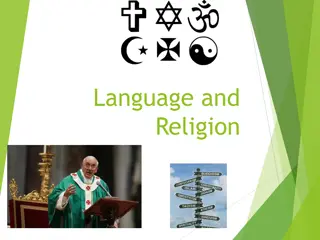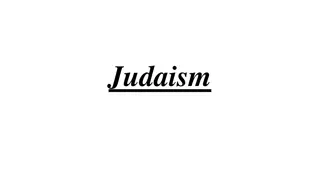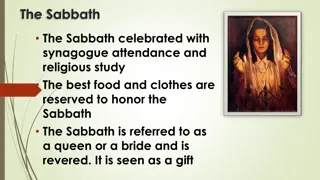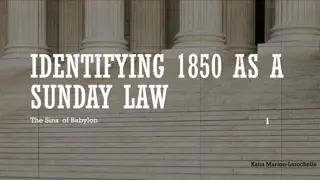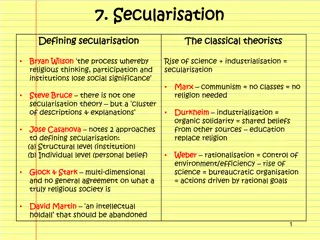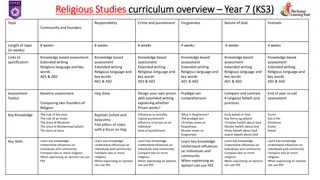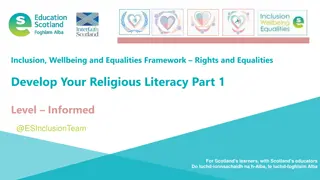Understanding Interfaith Harmony in Islamic Education
The third meeting conducted by the Islamic Education Faculty covered topics such as classroom regulations, tolerance among different religions, the concept of harmony among religious communities, and general challenges related to diversity in religious interpretations. The importance of maintaining
2 views • 13 slides
Status of Family Laws in India: Hindu vs. Religious Minorities
The family and personal status laws in India vary between Hindu law and those pertaining to religious minorities. While Hindu law has seen extensive reforms, discriminatory provisions still exist. In contrast, laws governing religious minorities have undergone fewer reforms, leading to greater inequ
2 views • 4 slides
The Universalism of Magna Carta: Freedom of Religion in Contemporary Nigerian Law
Magna Carta, a pivotal human rights document, is explored with a focus on its religious underpinnings and its influence on modern legal systems. The parallels and divergences between Magna Carta and Nigerian customary law regarding freedom of religion are examined. The implications of contemporary N
0 views • 16 slides
Religious Education Skills Progression for Years 5 and 6
This document outlines the long-term plan for the RE curriculum for Year 5 and 6 students, focusing on topics such as living by Christian values, exploring wisdom from different faiths, understanding the creation of the world, and expressing faith through art. It also covers the progression of skill
0 views • 31 slides
Religious Policies of Queen Elizabeth I: Seeking a Middle Way
Queen Elizabeth I of England navigated religious turmoil by establishing a middle way that balanced Protestant and Catholic elements. Her reign saw the passing of acts like the Act of Supremacy and Act of Uniformity to consolidate her power and create a distinct Church of England. Despite facing opp
0 views • 21 slides
Understanding Religious Conflict: Definition and Types Explored
Religious conflict is a complex and recurring concept throughout history. Scholars have defined it as disagreements between religious groups. This conflict arises from contentious issues touching on ideology, morality, power, and identity, influenced by various socio-political, economic, and cultura
1 views • 13 slides
Understanding Myth as Religious Language: Exploring Concepts and Interpretations
Explore the multifaceted nature of myths as religious language, delving into their equivocal definitions, truth claims about God, and use of rhetorical devices. Discover the significance of myths in providing human understanding of God, revealing divine attributes, and addressing fundamental questio
0 views • 17 slides
Overview of Religious Studies Course at Ramsey Grammar School
The Religious Studies course at Ramsey Grammar School for Year 9 students covers topics such as Christianity, Islam, Life and Death, Good and Evil, beliefs, practices, and church diversity. Students will be assessed through a written examination at the end of Year 11, with no coursework requirement.
0 views • 23 slides
Evolution of Akbar's Religious Policy: A Historical Overview
In the 16th century, Akbar the Great implemented a revolutionary religious policy in the Mughal Empire. Initially a devout Sunni Muslim, Akbar evolved his stance to promote harmony and equality among all religions, fostering tolerance and understanding. This shift marked a significant departure from
1 views • 25 slides
Embracing Religious Pluralism for a Harmonious Society
Educate yourself on world religions and religious oppression, empathize with religious minorities, combat generalizations, and promote belief inclusion in all aspects of life for a more just and peaceful world.
0 views • 6 slides
Elizabethan Religious Settlement: Unity Amidst Division
Amid religious division in England, Queen Elizabeth I implemented a Religious Settlement in 1559 to unify the country. The settlement, a blend of Protestant and Catholic elements, aimed to maintain peace and prevent rebellions. Elizabeth's strategic compromise pleased most people, though lingering t
0 views • 14 slides
Understanding Secularism: Principles and Advantages
Secularism is the principle of separating government institutions from religious entities to ensure equal rights for believers and non-believers. It safeguards freedom of religious belief and practice, upholds religious freedom, and promotes democracy and fairness. Secularism aims to prevent religio
0 views • 21 slides
Understanding Religious Language: Cognitivism vs. Non-Cognitivism in the University Debate
This discussion explores the debate between cognitivism and non-cognitivism in religious language. Cognitivism asserts that religious claims aim to describe the world and can be true or false, while non-cognitivism argues that such claims express attitudes and cannot be verified. Flew's challenge qu
0 views • 9 slides
Exploring Different Views on Christians and Christmas
This content discusses the various perspectives on celebrating Christmas among Christians. It delves into the origins of Christmas, differing views on its observance as a religious versus secular holiday, and the biblical references related to Jesus' birth and significance in Christian beliefs.
4 views • 18 slides
Guide to Using the BSA Calendar of Religious Observances
The BSA Calendar of Religious Observances is a valuable resource for scheduling scouting events in consideration of various religious holidays and observances. This guide provides an overview of the calendar, highlights important dates, and emphasizes the importance of respecting religious diversity
0 views • 8 slides
Understanding Jesus' Rejection in the Gospel of Mark
Explore the reasons behind the rejection of Jesus by the Pharisees in the Gospel of Mark, including his conduct, challenges, and claims. Discover how his actions conflicted with religious norms of fasting and Sabbath observance, leading to opposition from religious leaders. Jesus' role as the Brideg
1 views • 11 slides
Controversies and Teachings of Jesus: Lessons in Faith and Forgiveness
Jesus' life was marked by controversy as he clashed with religious authorities over forgiveness, food, Sabbath observance, and even his own sanity. Through his actions, Jesus demonstrated the power of faith, forgiveness, and love, challenging traditional beliefs and societal norms. His encounters wi
0 views • 11 slides
Understanding the Role of Language in Religion
Exploring the significance of language in religious contexts, this content discusses the functions, features, lexicon, grammar, and metaphorical aspects present in religious language. It delves into how religious language upholds spiritual beliefs, persuades believers, and expresses specific attitud
0 views • 8 slides
Understanding Judaism: History, Beliefs, and Practices
Judaism, the oldest of the three Abrahamic faiths, originated over 3500 years ago in the Middle East. With around 13.1 million Jewish people worldwide, Judaism emphasizes a covenant relationship with God, observance of religious laws, and bringing holiness into daily life. Central to Judaism is the
0 views • 91 slides
Understanding the Cultural Dimensions of Food and Religious Influences in Culinary Arts
Explore the impact of religious beliefs on food traditions and dietary restrictions across different cultures in the culinary world. Learn about the influence of major world religions on eating habits, food choices, and culinary practices. Discover how various religious groups, such as Christians, o
0 views • 26 slides
The Vital Role of Religious Institutions in Supporting Immigrants
Religions and immigration are interlinked in modern societies, where religions play a significant role in providing services, defending rights, and supporting the social cohesion of immigrants. Mainstream religious institutions serve as key actors in offering assistance, advocating for migrant right
2 views • 14 slides
Understanding Rosh Hashanah: Significance, Observance & Beliefs
Rosh Hashanah is the Jewish New Year, marking the beginning of the Days of Awe. This holiday holds great significance as a time for introspection, repentance, and seeking forgiveness. Discover the traditions, observance, and beliefs associated with Rosh Hashanah, including the practice of making ame
0 views • 14 slides
Understanding Religious Language: Flew, Hare, Mitchell
Exploring the contrasting views of cognitivism and non-cognitivism in the context of religious language through the perspectives of Flew, Hare, and Mitchell. Delve into Flew's challenge on the undetectable gardener, Hare's concept of bliks, and Mitchell's response to the rationality of religious bel
0 views • 7 slides
Understanding the Sabbath and Obsessive-Compulsive Disorder (OCD) Tendencies
The Sabbath is a sacred time for rest and reflection, marked by communal rituals and gatherings. However, for some individuals, the strict adherence to rules and performance-based emphasis can trigger OCD tendencies, leading to challenges in balancing religious observance with mental well-being.
0 views • 39 slides
Religious Accommodation in the Army: Advising Command
The content discusses the role of the Chaplain Corps in advising Soldiers and leaders on religious accommodation in the Army as of February 13, 2019. It covers learning objectives, legal foundations, Army policies, procedures, recent changes, and references related to religious accommodation. The in
0 views • 36 slides
The History of Sunday Laws: From Constantine to the Third Council of Orléans
The imposition of Sunday laws dates back to AD 321 when Constantine I decreed Sunday as a day of rest, with further developments occurring in 538 AD with the Third Council of Orléans. These laws signified the blending of pagan practices with Christianity, leading to the establishment of Sunday as a
0 views • 73 slides
Understanding Religious Discrimination Laws in California Workplace
Learn about the regulations and protections under FEHA and Title VII in California, including religious exemptions, accommodation requirements, case studies, and best practices to address discrimination issues effectively. Discover the statistical insights on religious discrimination complaints and
0 views • 45 slides
Understanding Secularisation: The Decline of Religious Influence in Society
Secularisation refers to the process in which religious thinking, participation, and institutions lose their social significance. This phenomenon is influenced by factors such as the rise of science, industrialisation, changing social attitudes, and the disengagement of the church from society. Evid
0 views • 8 slides
Philosophers' Views on Religious Experience: Insights and Critiques
This lesson delves into the perspectives of various philosophers such as Rudolph Otto, Richard Swinburne, John Hick, and Michael Persinger on religious experiences. It explores concepts like the numinous, religious knowledge, God's existence, and criticisms on the validity of religious experiences.
0 views • 7 slides
Philosophers' Views on Religious Experience: Insights from William James
Explore William James' perspective on religious experiences, including his views on existential and value judgments. Understand how James argued for the validity of religious experiences and their potential proof of God's existence. Delve into the implications of emotions and prior beliefs on interp
0 views • 7 slides
Religious and Social Conflicts Fueling the Rise of Absolutism in Europe
Social, economic, and religious conflicts in Europe played a significant role in the emergence of absolutism where monarchs wielded supreme power without sharing it with legislative bodies. Events like Spain's religious conflicts, Protestantism in England, the Spanish Armada, religious conflict in t
0 views • 10 slides
Religious Pluralism and Civil Society: A Paradox in Government Control
Understanding the intricacies of religious pluralism in the context of government control reveals a paradox where restricting religion can hinder social cohesion and economic growth. Through insights on the counterproductivity of control, the role of religious organizations in civil society, and the
0 views • 16 slides
An Overview of Ezra, Nehemiah, and the Persian Kings in 5777/2017 ELS
Explore the historical timeline of Ezra, Nehemiah, and the Persian Kings, covering events such as the destruction of the First Temple, the political struggles, the building of the Temple and walls in Jerusalem, and various challenges faced by the Jewish community during that period. Learn about the
0 views • 15 slides
US Religious Freedom Restoration Act (RFRA) Overview
The US Religious Freedom Restoration Act (RFRA) aims to protect the free exercise of religion by ensuring that governments do not substantially burden religious practices without compelling justification. It emphasizes striking a balance between religious liberty and governmental interests through t
0 views • 9 slides
Understanding the Christian Views on Christmas
The Christian perspective on Christmas varies, with different viewpoints on its observance and significance. Some emphasize its religious observance as commemorating the birth of Jesus, while others view it as having pagan roots. Scriptural references provide context on the observance of Jesus' birt
0 views • 18 slides
Religious Studies Curriculum Overview for Year 7 and 8 (KS3)
Explore various topics such as responsibility, crime and punishment, forgiveness, nature of God, festivals, community, founders, worship, creation, life after death, rules and laws, relationships in this detailed Year 7 and 8 (KS3) Religious Studies curriculum. The curriculum includes assessments, e
0 views • 6 slides
Celebrate Navaratri A Unique Saree Guide for Each Day
Navaratri is not just a religious observance; it\u2019s an opportunity to celebrate colors, traditions, and the joy of dressing up. Wearing the right saree each day allows you to honor the festival's essence while expressing your unique style. Whethe
0 views • 7 slides
Comprehensive Role of CP-CPHC Team in Patient Safety Day Observance
The CP-CPHC team plays a crucial role in ensuring patient safety during observance days by providing home-based palliative care services such as back care, catheter care, and oral care. ASHAs identify patients in need and utilize home care kits. Training resources and skill videos are available on Y
0 views • 5 slides
Developing Religious Literacy for Educators in Scotland
This resource aims to enhance educators' understanding of religious literacy by exploring religious discrimination, core beliefs of major faiths, and additional learning sources. It encourages educators to consider the needs of learners in relation to their religious beliefs in Scotland.
0 views • 30 slides
Settling the Northern Colonies: Religious Transformation and Colonization
The Protestant Reformation led to the emergence of Puritanism in the Northern Colonies, with figures like Martin Luther and John Calvin shaping religious beliefs. The Massachusetts Bay Colony stood as a beacon of self-government and religious ideals, while dissenters like Anne Hutchinson and Roger W
0 views • 9 slides


